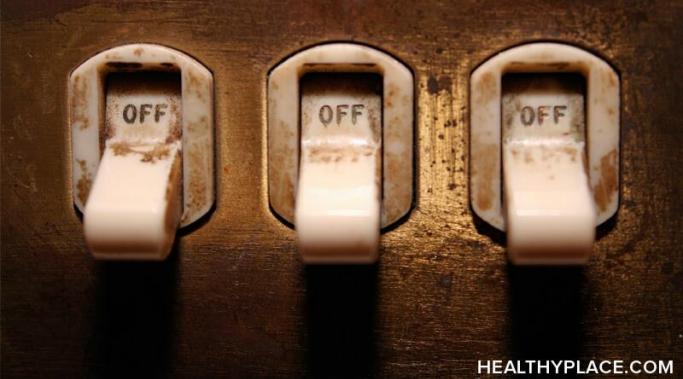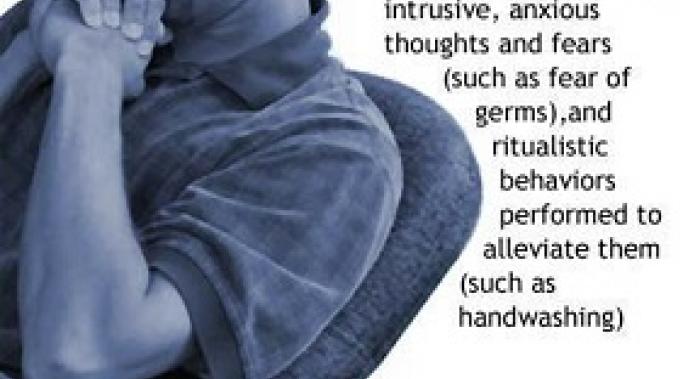Intrusive thoughts can sometimes accompany obsessive-compulsive disorder (OCD) and anxiety disorders like generalized anxiety disorder (GAD). Intrusive thoughts are disturbing to experience, and they can cause extreme stress and heightened anxiety. They can invade the mind without warning; further, they can be dark and downright terrifying. The previous post examined what the intrusive thoughts of OCD and anxiety are and are not. (Quick review: intrusive thoughts are not a sign that you or someone you know is a terrible person.) Now let's explore how to deal with these intrusive thoughts so you can reduce anxiety and discomfort.
OCD - Anxiety- Schmanxiety Blog
Experiencing intrusive thoughts is one of the most terrifying aspects of obsessive-compulsive disorder (OCD) and anxiety disorder such as generalized anxiety disorders (GAD). If you are bombarded repeatedly by distressing ideas and images, you might want to hide it because you are afraid that there's something wrong with you. However, that belief comes from fear and anxiety. Intrusive thoughts aren't an indication that you are a terrible person. This look at intrusive thoughts in OCD and anxiety can help you understand what's happening and learn how to deal with these alarming, unwanted thoughts.
Does social media cause anxiety or not? Though social media is often seen as something that provokes anxiety, I find that social media platforms can be useful in alleviating my anxiety symptoms. I am anxious when I see disturbing news or opposing political views on my social media. But having an online support group for my anxiety disorders and my life, post-divorce, has been invaluable to me. For this and many other reasons, I find my social media to be a bit of a double-edged sword regarding anxiety management and knowing whether social media is causing anxiety.
Obsessive-compulsive disorder (OCD) doubt and uncertainty is something I've struggled with since I was a young child. Obsessive-compulsive disorder is often dubbed “the doubting disease” because it makes you second-guess yourself. And uncertainty about life can make my anxiety skyrocket. Obsessive-compulsive disorder doubt and uncertainty about life can be debilitating, but I am finding small ways to cope.
Obsessive-compulsive disorder (OCD) makes me doubt myself, turning me into my own worst critic. Self-deprecation is my specialty. “Don’t be so hard on yourself,” is a phrase I hear from someone else every other day. And yes, I am hard on myself, but I feel I am not as hard on myself as I should be. I had an entirely different article written and dismissed it as being (choice phrases that I won’t say on this blog). It is difficult to live in a partially self-constructed mental prison. Obsessive-compulsive disorder makes me doubt myself. It makes me my own worst critic of everything I do, say, or think.
Recognizing obsessive-compulsive disorder (OCD) rituals can be an important journey of self-discovery. Obsessive-compulsive disorder sufferers often have mental rituals that help lessen their worries and unwanted thoughts. When a sufferer performs an OCD ritual, it can temporarily help relieve anxiety. The rituals may seem illogical to those who don’t have the disorder. But to those who suffer from this often-devastating condition, recognizing OCD rituals and their triggers can sometimes lead to greater self-understanding and relief.
Anxiety brings with it a seemingly endless list of struggles and frustrations. A very common frustration and, for me, incredibly bothersome is anxiety’s loud, unrelenting hyperactivity. The feeling of hyperactivity is sometimes related to anxiety's racing thoughts.
I'm sure you've heard these statements:
He's so OCD.
Quit being so OCD.
This is just my OCD coming out.
The term OCD has become common in our society. Stigma turned OCD into an adjective that we frequently use to describe someone who likes things a certain way. However, OCD, short for obsessive-compulsive disorder, is much more than a compulsion for neatness.
Do you have travel anxiety? Has anxiety affected your travel plans and/or preparations?
Traveling can bring up tons of worries: Will I be okay? What if something happens to people back home while I am away? What if I am alone and afraid? What if the plane crashes? What if it is overwhelming? What if I miss the plane, or hate my accommodations? What if I get lost? What if I am homesick, but stuck there? What if I can't get home? What if someone gets mad at me? What if I get anxious?
You name the worry, I have heard it and then some. All these worries just about make you want to stay home!
The very first assistant I hired never made a mistake on my schedule, and my clients loved her because she was so kind with them on the phone. She had great ideas and an ability to find the answer to a problem no matter how long it took.
The problem was that it took forever. Everything took forever. Nothing was ever done because she did it over and over to get it just right. At the same time, she had trouble showing up. Yes, I mean she often didn't come to work. If she couldn't come on time and perfectly ready to work, she didn't come. And anything and everything was an excuse.
Her perfectionism made her unable to function. Let go of perfectionism: it is grossly inefficient and could get you fired.









